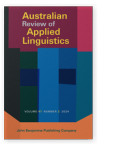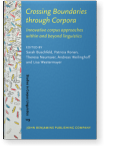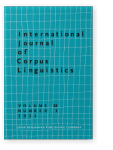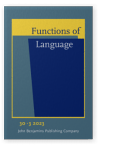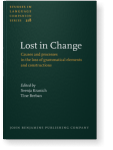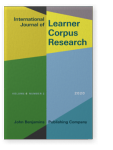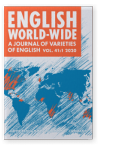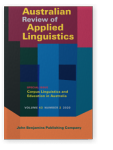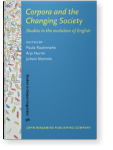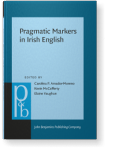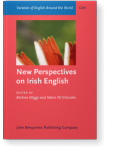Martin Schweinberger
List of John Benjamins publications for which Martin Schweinberger plays a role.
Journal
2024 Chapter 3. A corpus-based comparative acoustic analysis of target-like vowel production by L1-Japanese learners and native speakers of English Crossing Boundaries through Corpora: Innovative corpus approaches within and beyond linguistics, Buschfeld, Sarah, Patricia Ronan, Theresa Neumaier, Andreas Weilinghoff and Lisa Westermayer (eds.), pp. 41–61 | Chapter
This study combines acoustic phonetics, (applied) corpus linguistics, machine learning, and speech recognition to analyse the production of the monophthongal vowels / ɐ ɒ æ e ɛ i: ɪ u; ʊ ʌ / in the speech of L1-Japanese learners and L1-speakers of English based on transcripts and audio data from… read more
2023 Research trends in corpus linguistics: A bibliometric analysis of two decades of Scopus-indexed corpus linguistics research in arts and humanities International Journal of Corpus Linguistics 28:3, pp. 344–377 | Article
This paper uses a bibliometric analysis to map the field of Corpus Linguistics (CL) research in arts and humanities over the last 20 years, tracking changes in popular CL research topics, outlets, highly cited authors, and geographical origins based on the metadata of 5,829 CL-related articles… read more
2023 On the L1-acquisition of the pragmatics of discourse like Functions of Language 30:3, pp. 255–286 | Article
This study analyzes the L1-acquisition of discourse like and its pragmatic functions in American English based on the Home-School Study of Language and Literacy Development component of the Child Language Data Exchange System (CHILDES). The data show that discourse like is already present in the… read more
2021 On the waning of forms – A corpus-based analysis of decline and loss in adjective amplification Lost in Change: Causes and processes in the loss of grammatical elements and constructions, Kranich, Svenja and Tine Breban (eds.), pp. 235–260 | Chapter
This study takes a corpus-based approach to investigating the decline and near-loss of very as an adjective amplifier in spoken New Zealand English (NZE) based on The Wellington Corpus of Spoken New Zealand English. The paper analyzes the replacement of very as the dominant adjective amplifier… read more
2020 A corpus-based analysis of differences in the use of very for adjective amplification among native speakers and learners of English International Journal of Learner Corpus Research 6:2, pp. 163–192 | Article
This paper analyzes the use of very as an adjective amplifier by native speakers and advanced learners of English with diverse language backgrounds based on the International Corpus of Learner English (ICLE) and the Louvain Corpus of Native English Essays (LOCNESS). The study applies… read more
2020 Speech-unit final like in Irish English English World-Wide 41:1, pp. 89–117 | Article
This paper investigates the use of speech-unit final like (SUF like) in standard Irish English (IrE) and takes a variationist approach based on the Irish component of the International Corpus of English (ICE-IRL). The analysis includes both sociolinguistic factors (age, gender, occupation type,… read more
2020 How Learner Corpus Research can inform language learning and teaching: An analysis of adjective amplification among L1 and L2 English speakers Corpus Linguistics and Education in Australia, García, Alexandra I., Peter Crosthwaite and Monika Bednarek (eds.), pp. 196–218 | Article
This study aims to exemplify how language teaching can benefit from learner corpus research (LCR). To this end, this study determines how L1 and L2 English speakers with diverse L1 backgrounds differ with respect to adjective amplification, based on the International Corpus of Learner English… read more
2020 Analyzing change in the American English amplifier system in the fiction genre Corpora and the Changing Society: Studies in the evolution of English, Rautionaho, Paula, Arja Nurmi and Juhani Klemola (eds.), pp. 223–250 | Chapter
This study examines the diachronic development of amplification of adjectives in American English (AmE), specifically in the fiction section of the Corpus of Historical American English (COHA). The results show that amplifier use in attributive contexts remains stable, while, in predicative… read more
2015 A comparative study of the pragmatic marker like in Irish English and in south-eastern varieties of British English Pragmatic Markers in Irish English, Amador-Moreno, Carolina P., Kevin McCafferty and Elaine Vaughan (eds.), pp. 114–134 | Article
This study compares the use of like in Irish English (IrE) to its use in southeastern
British English (SE-BrE). There are significant differences between the
use of like in IrE and SE-BrE in terms of overall frequency, social meaning and
positioning. This paper argues that the differences in the… read more
2012 The discourse marker LIKE in Irish English New Perspectives on Irish English, Migge, Bettina and Máire Ní Chiosáin (eds.), pp. 179–202 | Article
This paper analyses the use of the discourse marker LIKE in Irish English (IrE) with respect to a speaker’s age and gender and illustrates how the International Corpus of English (ICE) can be used for fine-grained sociolinguistic analyses. The results suggest that LIKE use significantly decreases… read more
